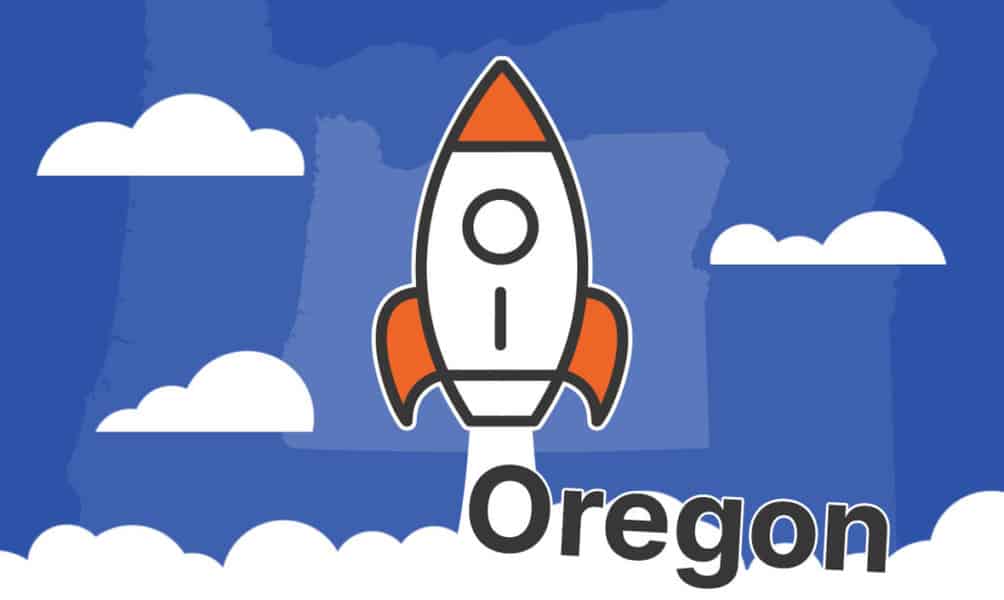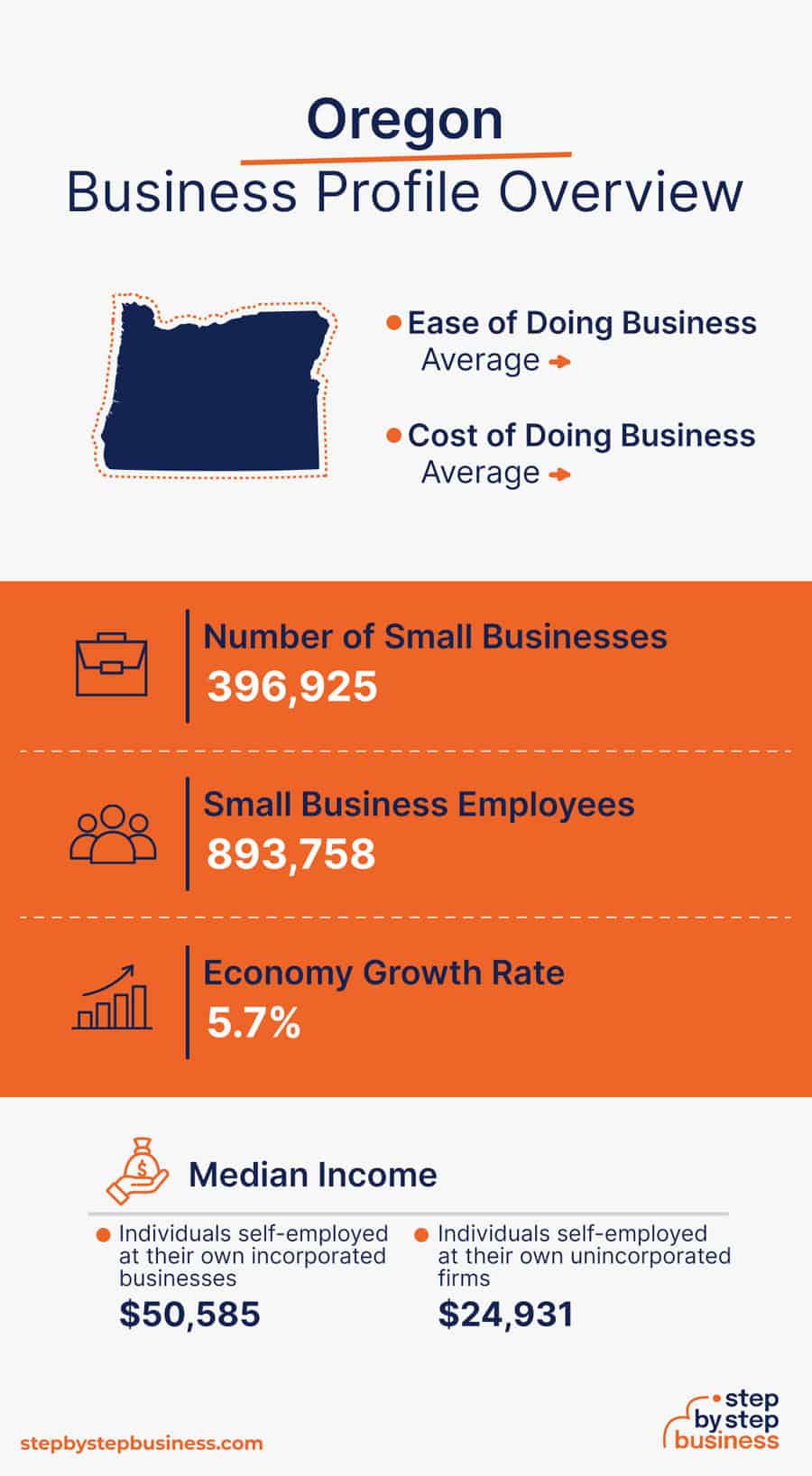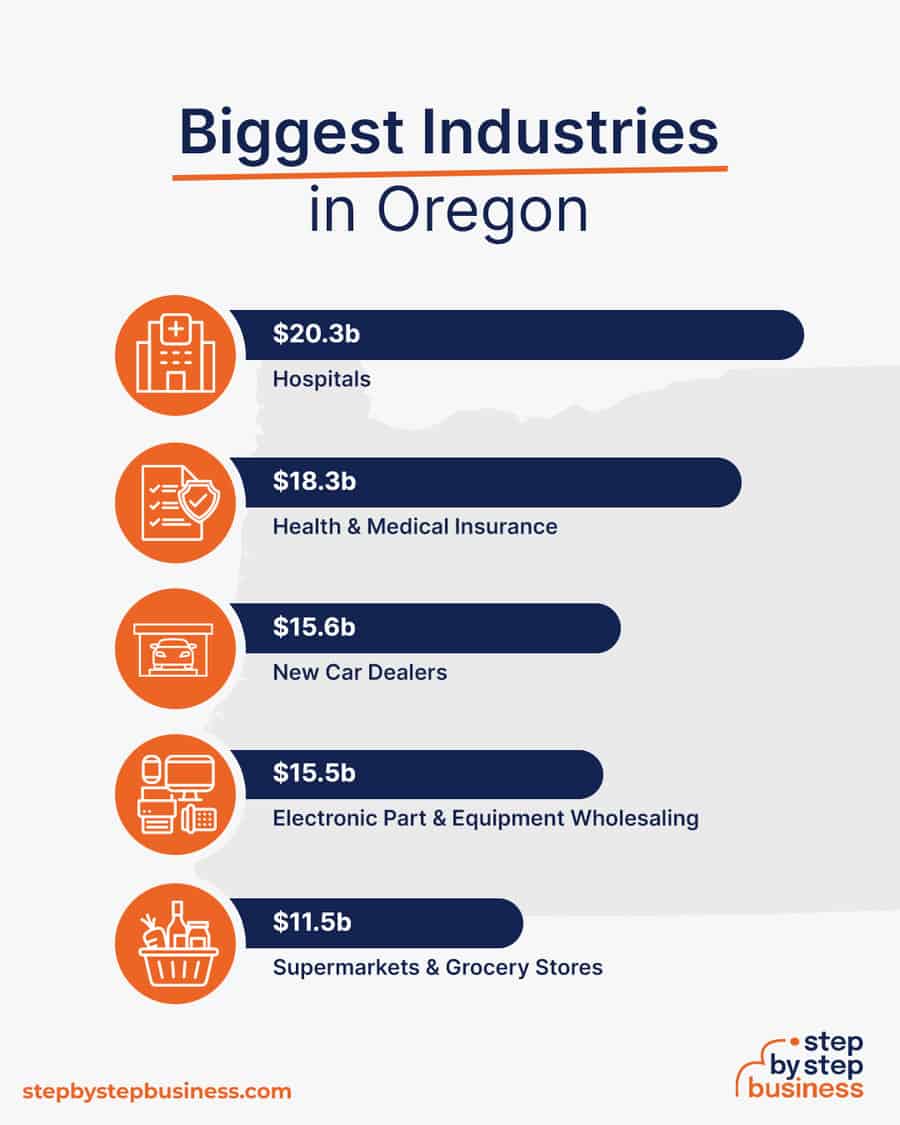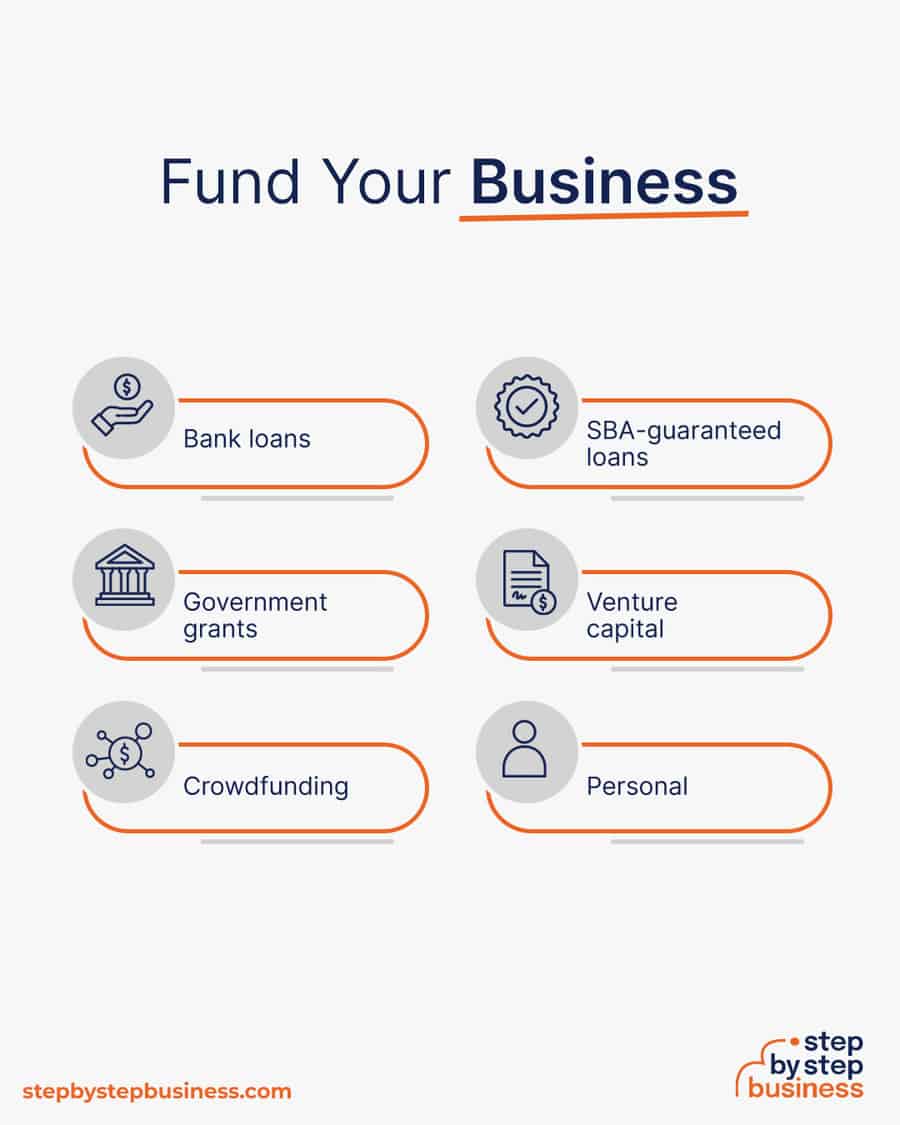What to do if you’re itching to start a business, but that perfect idea just doesn’t come to mind? Luckily for you, we have an answer (or rather ...
The IRS website also offers a tax-payers checklist and taxes can be filed online.
We earn commissions if you shop through the links below. Read more
Written by: Carolyn Young
Carolyn Young is a business writer who focuses on entrepreneurial concepts and the business formation. She has over 25 years of experience in business roles, and has authored several entrepreneurship textbooks.
Edited by: David Lepeska
David has been writing and learning about business, finance and globalization for a quarter-century, starting with a small New York consulting firm in the 1990s.
Published on November 10, 2021

With the glorious natural beauty of the Pacific Northwest and the inexpensive, urban cool of Portland, Oregon has much to offer the rising entrepreneur. The state’s laws contribute to a pro-business climate with a relatively favorable tax system and a highly educated workforce.
Oregon ranked 24th in a 2023 index of state business taxes((https://taxfoundation.org/2023-state-business-tax-climate-index/)), with low sales and property taxes and several property tax exemptions for individuals and organizations.
If you’re ready to start your own business, Oregon might be the right fit. This step-by-step walks you through the complicated process of getting your business going in the so-called “Beaver State.”

By 2022 revenue((https://www.ibisworld.com/united-states/economic-profiles/oregon/))

The crucial first question is, what sort of business would you like to run? You may have several ideas in mind, or maybe you haven’t gotten that far. Either way, it’s wise to look closely at the state itself and at your own abilities to best determine which areas might offer the most opportunity.
To develop a business idea, you could:
Once you have a few ideas in mind, do some homework to decide if your ideas are feasible. Here are some things to consider when choosing a business idea:
Once you have chosen a business idea, get more specific in your evaluation of the opportunity. Consider the why, what, how, and who.
Before anything else, consider the viability of the business idea you have in mind. Here are three questions to consider:
Starting a business will require investment, so you mustn’t just leave the profitability of your idea to assumptions. Make it a point to conduct your own research and ask people you know and trust what they think of your idea.
The next thing to do is define your offerings. Ask yourself:
You may consider offering related products or services to increase purchase sizes and boost overall value for customers. This step is going to define what your business will look like to customers and why they will buy, so take your time and be sure.
Before determining your price list, get to know your competitors. Visit the shops and websites of companies that offer the same or similar products or services — see what they’re selling and at what prices, and use this to inform your decisions.
If you have a direct competitor, it’s a good idea to choose a competitive price point. Run the numbers to determine your break-even price, then decide your profit-generating mark-up from there.
You’ll also need to consider how to position your product. Are you going to offer a lower-priced alternative, a la Walmart, or are you going to position your business as more high-end, like a Pottery Barn or Restoration Hardware?
Once you’ve locked on a pricing system that works for you, you’ll need to test it to see if this is attractive to your target market.
Knowing your target market is crucial to successful sales and marketing. This is where customer profiling comes in handy.
The first thing to do is figure out whether you are selling to consumers or businesses. If you are selling to consumers, determine which people are most likely to buy, by looking at:
Knowing your customers will allow you to shape your messaging, and to know where to place your marketing. For example, based on who your customers are and what they like, are they more likely to be on Facebook or TikTok?
If you are selling to businesses, first determine what kinds of firms will be interested in what you’re offering. Next, figure out who would be the decision-maker within these companies — maybe it’s a VP, or IT manager, or head of sales — and, adjust your marketing accordingly.
Your business name is your business identity, so choose one that encapsulates your objectives, services, and mission in just a few words. You probably want a name that’s short and easy to remember.
Here are some ideas for brainstorming your business name:
Once you have a few potential names, check the Oregon state website to confirm they are available to register. You should also confirm that the name you want to register conforms to Oregon state regulations on business names.
It’s also a good idea to check for nationally trademarked names, to ward off any potential problems later if your business expands, and check the availability of related domain names using Domain Name Checker tool. Using “.com” or “.org” sharply increases credibility, so it’s best to focus on these.
Once you’ve found a name that clears these hurdles, go ahead and check the Oregon Business Registry Database for your name’s chosen availability within the state and then go to the Oregon Business Registry to get started with registration.
Drawing up a business plan may seem like a daunting task, but it’s an essential step in creating a successful business. The plan will function as a trail map to guide your startup through the launch process and maintain focus on your key goals. A business plan also enables potential partners and investors to better understand your company and its vision.
If you’ve never created a business plan yourself before, it can be an intimidating task. Consider hiring an experienced business plan writer to create a professional business plan for you.

Choosing your business location is an important decision because it can affect your taxes, legal requirements, and revenue. But you’ve already decided to launch your business in Oregon, so we can check that box.
Businesses come in several varieties, each with its pros and cons. The legal structure you choose for your business shapes your taxes, personal liability, and business registration requirements, so it’s important to choose wisely.
The most popular business entity types are outlined below.
Sole proprietorship is the most simple and straightforward structure, and therefore the most common for small businesses. It is an unincorporated business, with no legal distinction made between the business and the owner. This means that as a sole proprietor you get to keep all the profits, but are also personally liable for any debts, losses, or liabilities.
A general partnership is similar to sole proprietorship, but in this case two or more people form the company. Again, they keep the profits but are jointly liable for any losses or liabilities. In a general partnership, each partner is known as a general partner and has unlimited liability.
This business structure is popular with lawyers, accountants and architects. It is more formal than a general partnership, and allows each limited partner to limit their liabilities and share management responsibilities according to an agreement between the partners. This can be a good choice when one or more partners wants to invest in the business but have little or no management responsibility. Here are some resources:
In Oregon, you can only form an LLP if you are licensed as a lawyer, architect, accountant, or other such professionals.
There is a $100 processing fee to register your LLP in Oregon, and all business entities are required to appoint a registered agent with a physical street address in Oregon.
The next step up is a corporation, in which the company is a separate legal entity from its owners. In this structure, the owners are not personally liable for losses, but take their profits through shareholder dividends.
If you choose to create an Oregon corporation, you will also need to decide whether you want to form a C corporation or an S corporation. Here are some resources:
Each form requires a $100 processing fee. To see the general “Oregon Business Registry” site online, click here. From there, you will be able login and register, renew, or reinstate your business.
A limited liability company (LLC) combines characteristics of corporations with those of sole proprietorships. As the name suggests, the owners are not personally responsible for liabilities or debts.
Although LLCs are more straightforward to set up than a corporation, Articles of Organization must be filed with the state for the LLC to become a legal entity.
Some resources:
There is a $100 processing fee to register your LLC in Oregon, and similar fees for other forms for amendment, dissolution, restated articles, etc.
You will also need to appoint an Oregon registered agent. Your registered agent will be responsible for receiving paperwork from the state.
An easy and quick way to form an LLC in Oregon is to use ZenBusiness’s online LLC formation service.
Finally, you may be interested in a nonprofit if your business idea has a social purpose. A non-profit organization is a legal entity organized and operated for a public or social benefit, as opposed to a business formed to generate a profit for its owners.
You will also need to appoint a registered agent, also known as an agent for the service of the process. Your Oregon registered agent will be responsible for receiving all of the official paperwork sent from the state.
Here are some resources:
There is a required processing fee of $50.

The final step before you’re able to pay taxes is getting an Oregon Employer Identification Number or EIN. You can file for your EIN online or by mail or fax: visit the IRS website to learn more. Keep in mind, if you’ve chosen to be a sole proprietorship you can simply use your social security number as your EIN.
Once you have your EIN, you’ll need to choose your tax year. Financially speaking, your business operations will occur over the period of a calendar year (January–December) or a fiscal year, a 12-month period that can start in any month. This will determine your tax cycle, while your business structure will determine which taxes you’ll pay.
The IRS website also offers a tax-payers checklist and taxes can be filed online.
It is important to consult an accountant or other professional to help you with your taxes to ensure you are completing them correctly.
In Oregon, all businesses are required to register with the Secretary of State. You can also check out the 2020 Oregon Individual Income Tax Guide for all you need to know about taxes in your state. Additionally, the Oregon Center for Public Policy provides detailed information about the state’s tax system.
The state government provides an exhaustive list of business tax requirements and guidance, including the corporate income tax and corporate activity tax. Some of these taxes will depend on the specifics of your business operation while others will apply to most or all businesses.
There is a recurring annual LLC fee in Oregon of $100. See this online Business Registry Fee Schedule for more info on each type of entity and its required fees in Oregon.
After creating your business plan, you should have a much clearer idea how much money you’ll need to launch your business. Securing financing is your next step and there are plenty of ways to raise capital:

You may need to obtain certain business licenses and permits to comply with Oregon law. These permits and licenses can vary based on the town or city where the business is located. If you are selling tangible goods in Oregon, you will need a seller’s permit.
Here are some resources:
Your city, town, or county may also have additional requirements, such as signage and zoning permits. Speak to representatives of your local governments about licensing requirements.
This is not a step to be taken lightly, as failing to comply with legal requirements can result in hefty penalties.
If you feel overwhelmed by this step or don’t know how to begin, it might be a good idea to hire a professional to help you check all the legal boxes.
For peace of mind and to save time, we recommend using MyCorporation’s Business License Compliance Package. They will research the exact forms you need for your business and state, and provide them to you to make sure you’re fully compliant.
In order to launch your business, you will need to have somewhere to keep the money you make, and that requires opening a bank account.
Keeping your business finances separate from your personal account makes it easy to file taxes and track your company’s income, so it’s worth doing even if you run your business as a sole proprietorship. Opening a business bank account is quite simple, and similar to opening a personal one. Most major banks offer business account options, just inquire at your preferred bank to learn about rates and features.
Banks vary in terms of offerings, so it’s a good idea to consider your options to choose the best plan that works for you. Once you choose your bank, you’ll need to bring your EIN (or Social Security Number if you decide on a sole proprietorship), articles of incorporation, and any other legal documentation that proves your business is registered.
Business insurance is an area that often gets overlooked yet is vital to your success as an entrepreneur. Insurance protects you from unexpected events that can have a devastating impact on your business.
Here are some of the different types of insurance to consider:

As opening day nears, prepare for launch by reviewing and improving some key elements of your business.
New businesses need to have the right tools and industry-specific software in place to help them manage their operations effectively.
One of the most important tools for a new business is an inventory management system, which allows them to track their inventory levels, monitor sales, and reorder products when necessary.
Another essential tool is a customer relationship management (CRM) system, which helps businesses manage their interactions with customers and prospects, and track sales leads.
Other useful software for new businesses might include payroll software, project management tools, and marketing automation software. By investing in the right tools and software, new businesses can streamline their operations, save time and money, and ultimately increase their chances of success.
Website development is crucial because your site is your online presence and needs to convince prospective clients of your expertise and professionalism.
You can create your own website using services like WordPress, Wix, or Squarespace. This route is very affordable, but figuring out how to build a website can be time-consuming. If you lack tech-savvy, you can hire a web designer or developer to create a custom website for your business.
They are unlikely to find your website, however, unless you follow Search Engine Optimization (SEO) practices. These are steps that help pages rank higher in the results of top search engines like Google.
Online marketing is crucial for new businesses as it provides a cost-effective way to reach a wider audience and build brand awareness. With a well-planned online marketing strategy, new businesses can establish their presence, attract potential customers, and compete with established players in their industry.
Here are some powerful digital marketing strategies for small businesses:
Take advantage of your website, social media presence and real-life activities to increase awareness of your offerings and build your brand.
Traditional marketing is any form of marketing that uses offline media to reach an audience. Some options include:
As your business grows, you will likely need workers to fill various roles and positions. But before you begin the hiring process, you should first consider the essential positions for your line of work.
What levels of management and employees will you have? What is your pay scale? Costs are always an issue for a startup, but you need to make sure that you pay enough to hire people with the right skills and experience.
Now you can create a hiring plan. First, determine which hires you’ll need to launch, then the future hires you’ll need as the business gets going. Be cautious and selective when hiring people for any role.
You want to build a great team that will make your business run smoothly and create a great work environment so you’ll retain them for a long time.
In Oregon, you can access resources for new employer forms through the Secretary of State website. These forms include Combined Employers Registration, Employer Identification Number, Employer Withholding Allowance Certificate (W4), Employment Eligibility Verification (I-9), and Oregon New Hire Reporting Form (Oregon Child Support).
Free-of-charge methods to recruit employees include publishing a job ad on LinkedIn or Facebook or using free classified sites like Jobs and AngelList. You might also use a premium recruitment option, such as advertising on Indeed, Glassdoor, or ZipRecruiter. Finally, you could hire a recruitment agency to help you find talent.
With everything in place, you’re now ready to throw open the doors on opening day! When you do, you’ll want some customers coming in. Here’s how to find them.
Make sure to highlight the unique selling propositions, or USPs, of your products and services. Customers may already want your offerings, so your job is to convince them to pick you over your competitors.
Here are some good selling points that you can capitalize on:

Make sure that you are selling through the right channels. You know your target customers by now – where and how are they most likely to buy? Do they buy online or in stores?
If you don’t have a store, you can find partner stores where your products can be sold. You can sell both online and directly but focus your efforts on the channel that matches your target market’s buying behavior.
If you’re selling to businesses, your sales channels may be online or they may involve direct sales calls. Again, understand the buying behavior of the decision-maker within the business.
Help clients find you more easily by placing your marketing where they are likely to find it. With the right marketing strategies in place, a business can reach new audiences, build brand awareness, and ultimately grow its customer base and revenue.
Effective marketing can help businesses differentiate themselves from competitors, establish a strong online presence, and engage with customers through various channels such as social media, email marketing, and advertising.
By investing in the right marketing tactics and continually analyzing and optimizing their efforts, businesses can position themselves for long-term growth and success.
Registering an LLC or corporation in Oregon will cost you a $100 filing fee. Obtaining a business license from the city or county where you’ll be operating will cost about $50. Recurring annual costs for corporations are $50, and $100 for LLCs. Depending on your business type, further fees may be required for various permits or licenses, which usually cost between $50-$100.
The state of Oregon does not have a general business license. However, many occupations and business types require special licenses, permits, or certifications to operate within the state. A prospective Oregon business owner should consult online with the Secretary of State.
A home office is fine, but for the most part, you cannot operate a retail store from your home without a residential development permit. The city of Portland, for instance, offers Type A and Type B home occupation businesses, with the former being restricted and the latter being regulated. In the case of rental property, you would likely need to get your landlord’s written permission to run your business. To be clear, a home business that crafts products you ship, such as candles, or provides services directly to the customer, such as landscaping, does not require a permit in Oregon.
Does a sole proprietor have to register with the state of Oregon?
Sole proprietors do not have to be officially registered with the Oregon Business Registry unless they are operating under an assumed name, i.e. “doing business as” (DBA) something other than their own name.

Published on August 7, 2024
What to do if you’re itching to start a business, but that perfect idea just doesn’t come to mind? Luckily for you, we have an answer (or rather ...
Read Now

Published on June 6, 2024
You’ve got a brilliant business idea, a solid execution plan, and an unbeatable drive. But wait! There’s one thing missing in yourentrep ...
Read Now

Published on October 30, 2023
Surprisingly, 50% of small businesses encounter financial hurdles in their first five years. Finding the right loan can be a lifeline, steering your ...
Read Now

Published on September 29, 2023
Ensuring that your business is protected against unforeseen events is crucial, and this is where choosing the right insurance provider becomesindisp ...
Read Now

Published on February 19, 2023
New business owners usually need to complete countless tasks before finally launching and doing business. One of the earliest and most importanthurd ...
Read Now

Published on August 12, 2022
From selling on Poshmark to operating an online gambling casino, the list of online businesses is endless. The pandemic has caused manyentrepreneurs ...
Read Now
No thanks, I don't want to stay up to date on industry trends and news.
Comments